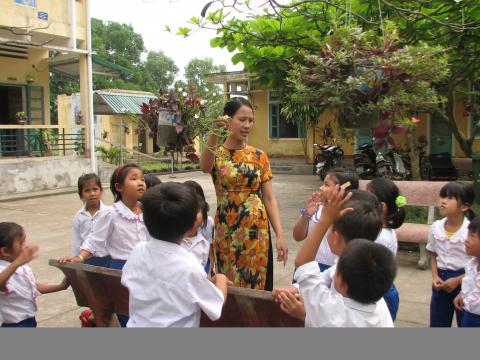Learning to Love School

Written by: Tran Thi Thu Tham - Education Project Assistant of Trieu Phong ADP, Hoang Minh Tuong - Education expert of Trieu Phong district
“I’m very happy being with Trang. We’re together every day, at school and at home,” said 3rd grader Anh, who has been paired with Trang at their primary school. “We help each other with everything we do, which makes our parents happy.”
“My daughter used to be very shy and she was nervous around lots of people,” said Mrs Thanh, Trang’s mother. “But she’s changed a lot. She’s more confident and works harder on her schoolwork,” Mrs Thanh continued. “She’s learned about life skills and child rights and she’s joined a children’s club. That’s made me happy and I hope other kids have similar opportunities.”
Trang’s personal development has been fostered through World Vision’s educational activities in her school in Trieu Trach community, which are organised by World Vision’s Trieu Phong Area Development Programme (ADP).
Trang’s primary school, in Quang Tri province, was inaugurated in August 2000. In the early years of its life, the school had only five temporary classrooms, which were poorly lit, and lacked adequate furniture and other teaching equipment. There were no toilets, playground or any place to host child activities.
Most importantly, the school could not attract enough teachers during those early years due to its remote location. As a result, the teachers who did work at the school had to teach two shifts a day.
Local people mostly rely on small scale farming for their livelihoods, with a few running small businesses. Most of the children’s parents experienced limited education in their formative years, which added to their low incomes meant the pupils would often be absent from school. The poorest children and those living with disabilities were most likely to not attend school.
“During the school’s first year, the teachers taught for one shift and then visited all the families whose children were absent to encourage them to attend,” explained senior teacher Lan Huong. “They [the pupils often absent] were usually shy at school and many would only come into class if their mums stood outside.”
Since those difficult first few years, the teaching and learning environment of the school has changed considerably. Beginning in 2006, the ADP has cooperated with the district Department of Education and Training to train teachers in active learning methods, which aim to improve student participation in education. Pupils most in need have also been given school supplies and uniforms to help them go to school.
“Improvements in the school environment have created better conditions for the children to learn,” said the school’s principal Tran Xuan Ung. “Both the teachers and students can make learning and teaching aids themselves. They also keep the school equipment in good condition, so it can be used again and again.”
“The teachers have learned how to create lessons that engage the students and draw in their participation in class,” he added. “Also, the goal of inclusive education has built relationships between children with disabilities and their peers and they help each other more.”
The principal told that communication activities have been held at the school focusing on life skills and values to live by. These activities have given the students more confidence at school and in daily life. The principal also revealed that the pupils’ parents now pay more attention to their children’s education and have helped build classrooms and a school playground.
“World Vision has given us the resources to improve the quality of teaching and learning in local primary education,” said Hoang Van Thia, Deputy Manager of the Department for Education and Training in Trieu Phong.
“Students are more actively involved at school now and communication between them and their teachers is much better,” he continued. “Nearly all the kids enjoy classes now, not only the most able ones, and we’re going to use this model for ten other schools in the future.”